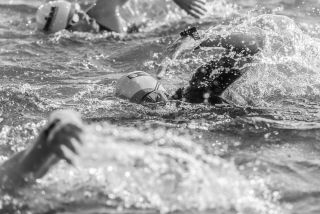Sport and Competition
A Reminder That I Can Do Hard Things
Personal Perspective: My wellness journey recently led me to a sprint triathlon.
Posted December 18, 2023 Reviewed by Tyler Woods
Key points
- I completed my second sprint triathlon as a crescendo to my recent wellness journey.
- I was a successful eating disorder therapist but felt beat up and stressed out by the treatment center world.
- Through supplementation, diet, and exercise, I began to slowly improve my biomarkers.

It was a cold, blustery morning as I stood poolside waiting for my timed start. Spectators were bundled up with coats, hats, and gloves as contestants shivered to stay warm in their swimwear. I scanned the other contestants who were in the pool or waiting poolside. All ages, body shapes, and sizes. All levels of ability. All there to compete or “just complete” a sprint triathlon. Was I crazy? Why would I choose to do this on a Saturday morning in December? Why would I choose to do this at all? Because I said I would. Twenty years ago, I competed in the same event, and my inner athlete compelled me to make a repeat appearance as a crescendo to my recent wellness journey.
My wellness journey began about five years ago
I was a successful eating disorder therapist but felt beat up and stressed out by the treatment center world. I started a private practice and began writing my memoir. I had to take an honest look at my life. I wasn’t practicing what I preached; I wasn’t employing compassion or applying the science of safety that I believe in so passionately. My body needed some serious attention. I began working with a naturopathic doctor, and we learned about my MTHFR mutation, high inflammation markers, sleep apnea, high circulating insulin levels, and a host of bad gut bacteria feeding on my colon. No wonder I was tired, anxious, and craving sugar! Through supplementation, mostly a plant-based diet, and participation in water aerobics, walking, and cycling, I began to slowly improve my biomarkers.
It wasn’t until I turned 60 that things started to markedly change. It all started with wanting to play pickleball. My husband and I took a few lessons. We began to play singles on a court in our neighborhood. Looking back, my husband was very gracious and held his tongue when I declared one day, “I think there is something seriously wrong with me! My heart is racing, and I can’t catch my breath.” My knees were sore and swollen. I was determined not to let my body stop me from participating in this sport. I was a tennis player for much of my life, and my mother was still playing pickleball in her 80s. “I was only 60,” I told myself.
So I found a sports medicine doctor who put me through several tests: metabolic, cardiac, and skeletal. He entered the exam room and greeted me with a fist bump and said, “My dear, there is nothing wrong with you. You are just an aging athlete, and it’s nothing we can’t fix.” At that moment, I sourced my inner athlete and embraced that identity. I was now in training. Two rounds of physical therapy, followed by continued strength training, solved my knee problems. I ate like an athlete: protein intake to help with lean mass and glucose control and always supplemented after a workout.
When I turned 62, I saw something on social media about the sprint triathlon
I had 16 weeks, so I hired the same trainer I had 20 years prior (she was retiring at the end of the year). I swam, biked, and ran (walked mostly in the beginning) at increasing distances and paces. Of course, there were days I didn’t want to train, but I really surprised myself and began to crave a great workout, especially running. So weird. Even better, my sleep, mood, and energy improved through the process. I can happily say my sleep apnea has corrected itself; I no longer have hyperinsulinemia; and my inflammation markers are normal.
Not everyone identifies with being an athlete, but it works for me. Who do you want to be? Be that person. Now. Don’t wait. Whatever you do, employ compassion, and model the science of safety.
And yes, I finished the sprint triathlon on that cold, windy day last weekend.
My time was only 10 minutes longer than my finish 20 years ago.
It was hard. But I can do hard things.


